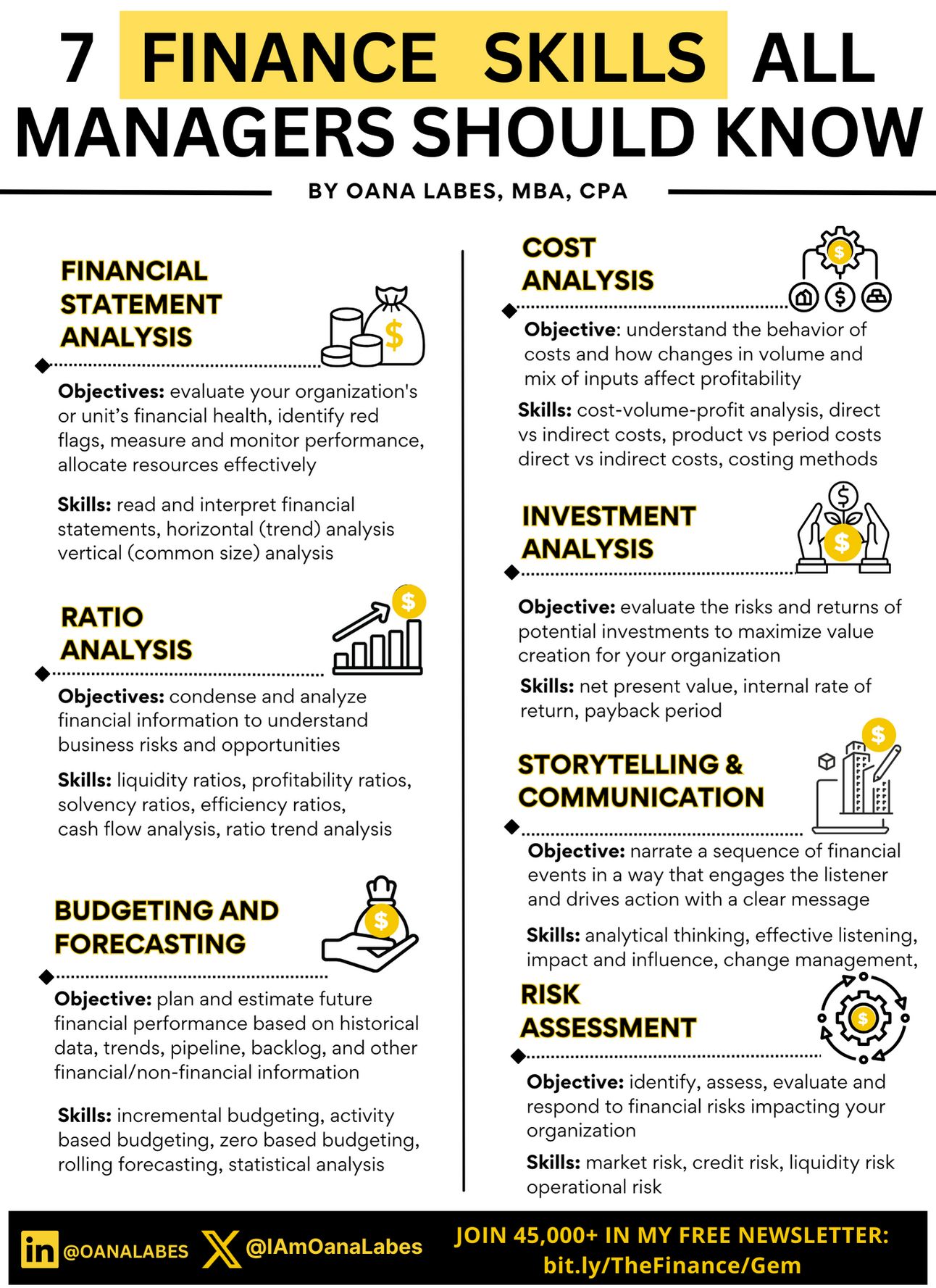
Hey there and welcome!
Here’s what I’m covering in today’s issue of The Finance Gem:
7 Finance Skills Every Leader Needs to Master
CEO Financial Intelligence Program Enrollment Opens Soon (and I need your input)
Team Hiring Update
AI CFO webinar I'm attending this Friday
Ready? Let’s dive in.
If you’re tired of feeling lost when financial reports hit your desk, read on.
Let me be blunt: if you can't read, understand, and act on financial statements, you're essentially gambling with your business.
Most leaders delegate financial literacy, thinking it's "the CFO's job."
But the best ones know that financial fluency is the foundation of every strategic decision you make. Without it, you're flying blind when allocating resources, missing red flags that could sink your department, and making decisions based on gut feelings instead of data.
Here are the 7 essential finance skills that separate great leaders from mediocre ones.

Skill 1: Master financial statement analysis to see your business clearly
This is where most managers struggle, and it’s costing them credibility in meetings and the boardroom.
Financial statement analysis boils down to three things: quickly spotting trends, identifying problems before they explode, and understanding whether your team is actually moving the needle.
So you need to read income statements, balance sheets, and cash flow statements with insight, just like you read your morning news.
The game-changer here is learning horizontal analysis (comparing performance over time) and vertical analysis (understanding what percentage each line item represents). These two techniques alone will make you confident in any financial conversation.
Skill 2: Use ratio analysis to uncover hidden business insights
Raw numbers lie, but ratios tell the truth. Let me explain…
A company might show $1 million in revenue, but if their profit margin is 2% while competitors average 15%, that's a red flag screaming for attention.
Ratio analysis condenses complex financial information into digestible insights that reveal risks and opportunities invisible to the naked eye.
Focus on four key ratio categories:
Liquidity (can you pay your bills?)
Profitability (are you actually making money?)
Solvency (can you survive long-term?)
and Efficiency (how well are you using resources?)
Understand these, and you'll spot business problems months before they become crises.
Skill 3: Build budgets and forecasts that actually guide decisions
Most budgets are just last year's numbers plus 10%. Yours should be a living tool you actually use in guiding decisions.
Smart business managers use rolling forecasts that update quarterly, using past performance, upcoming sales opportunities, and market trends to make better predictions.
Most importantly, they use them to stay prepared and ready to respond effectively to changing business dynamics.
Learn incremental budgeting for stable operations, zero-based budgeting for major changes, and activity-based budgeting when you need precision.
Each serves a different purpose, and knowing when to use which approach separates amateur budget-builders from strategic planners.
Skill 4: Analyze costs to maximize every dollar of profit
When you know which costs are fixed versus variable, direct versus indirect, you can model exactly how changes in volume, pricing, or product mix impact your bottom line.
This knowledge transforms you from someone who cuts costs blindly to someone who optimizes them strategically.
Master cost-volume-profit analysis, and you'll never again wonder whether that new product launch will be profitable or if reducing headcount will actually improve your margins.
You'll know exactly before you act.
Skill 5: Evaluate investments using proven financial frameworks
Every business decision is an investment decision, so treat it like one.
Whether you're choosing between two software platforms, deciding to hire additional staff, or evaluating a new market opportunity, you need frameworks that cut through the noise.
Net present value shows you the true economic value of an investment.
Internal rate of return tells you if it beats your cost of capital.
Payback period reveals how quickly you'll recoup your investment.
Use these tools for any decision involving significant time, money, or resources, not just major capital expenditures.
Skill 6: Tell compelling stories with your financial data
Stories give meaning to your numbers.
The most financially literate business leader in the world won't succeed if they can't communicate insights in ways that drive action. Analyzing financial data is only half the job. You also need to translate that analysis into narratives that engage stakeholders and inspire change.
Practice connecting financial trends to business outcomes, explaining complex concepts in simple terms, and always leading with the "so what" before diving into the "now what."
Always remember that your audience cares more about implications, rather than pure calculations.
Skill 7: Identify and mitigate financial risks before they hurt you
Good business means preparing for what could go wrong.
Every organization faces market risk (external economic factors), credit risk (customers not paying), liquidity risk (running out of cash), and operational risk (internal process failures).
The best leaders take a proactive approach: identify risks early and build contingency plans.
Develop systems to monitor key risk indicators in your business, create scenario plans for different risk events, and always know your organization's risk tolerance.
It's better to be prepared for risks that don't happen than unprepared for risks that do.
Financial literacy means making smarter decisions by seeing the financial impact of every move you make.
And speaking of financial literacy…
The CEO Financial Intelligence Program will soon open for enrollment
The next cohort of the CEO Financial Intelligence Program starts this September, and I’d love your input as we finalize the content.
This 6-week program is built for CEOs who want to grow faster and lead with financial intelligence. Inside, you will learn how to translate your vision into a clear roadmap, align strategy and capital to drive enterprise value, make confident funding decisions, and communicate more effectively with stakeholders.
As we shape the content for the next cohort, I’d love to hear from you.
What would make this program most valuable to you?
Please take a moment to answer the three quick questions below (it takes around 30 seconds).
We’re Hiring: Join my Team
I'm building a world-class team to expand my strategic finance platform. We're looking for top performers in:
Content management
Design & video
Newsletter management
Brand and partnership marketing
AI automation
Advanced Excel/Python/Power BI
Operations management
If you're strategic, efficient, and already fluent with tools like GPT, Zapier, ClickUp, Beehiiv, ConvertKit, Canva, Notion, Power Platform, this could be your chance to do meaningful work that impacts millions of people.
Ready to apply? Submit a 2-minute video introduction and your portfolio.
Learn AI in 5 minutes a day
This is the easiest way for a busy person wanting to learn AI in as little time as possible:
Sign up for The Rundown AI newsletter
They send you 5-minute email updates on the latest AI news and how to use it
You learn how to become 2x more productive by leveraging AI
Free CFO Masterclass: How To Become an AI CFO
My team and I will be attending Nicolas Boucher's live webinar: "How to Become an AI CFO" this Friday, June 27th.
I've known Nicolas for a while now. First, through his sharp LinkedIn content, and then through several projects we collaborated on. What struck me immediately was how he explains complex finance-AI topics in a way that's clear and immediately usable.
If you're serious about integrating AI into your finance operations, this is worth your time.
Nicolas will be covering practical AI tools that top CFOs are using right now, real automation strategies, and how to avoid the costly mistakes most finance teams make with AI.
That’s it for this week!
Oana
PS. To access the full Finance Gem library of issues older than 30 days and explore over 80 posts and more than 265+ breakdowns + exclusive downloads organized by topic, you can upgrade to a paid subscription here.
Looking for my viral Checklists and Cheat Sheets? Find them here.




